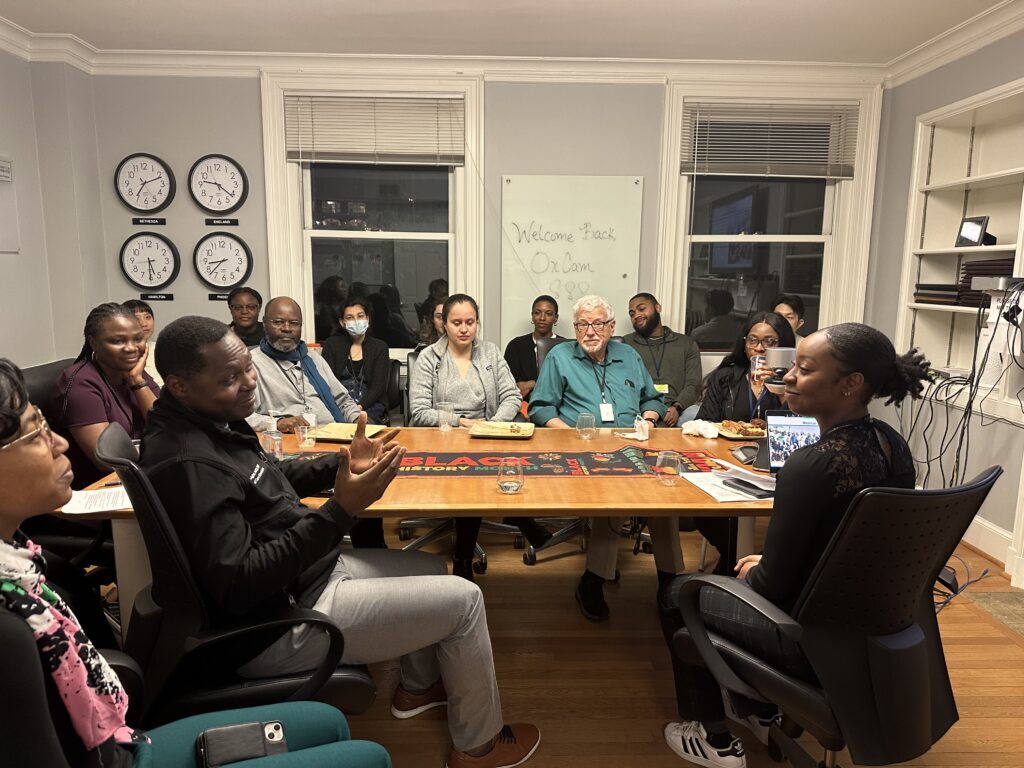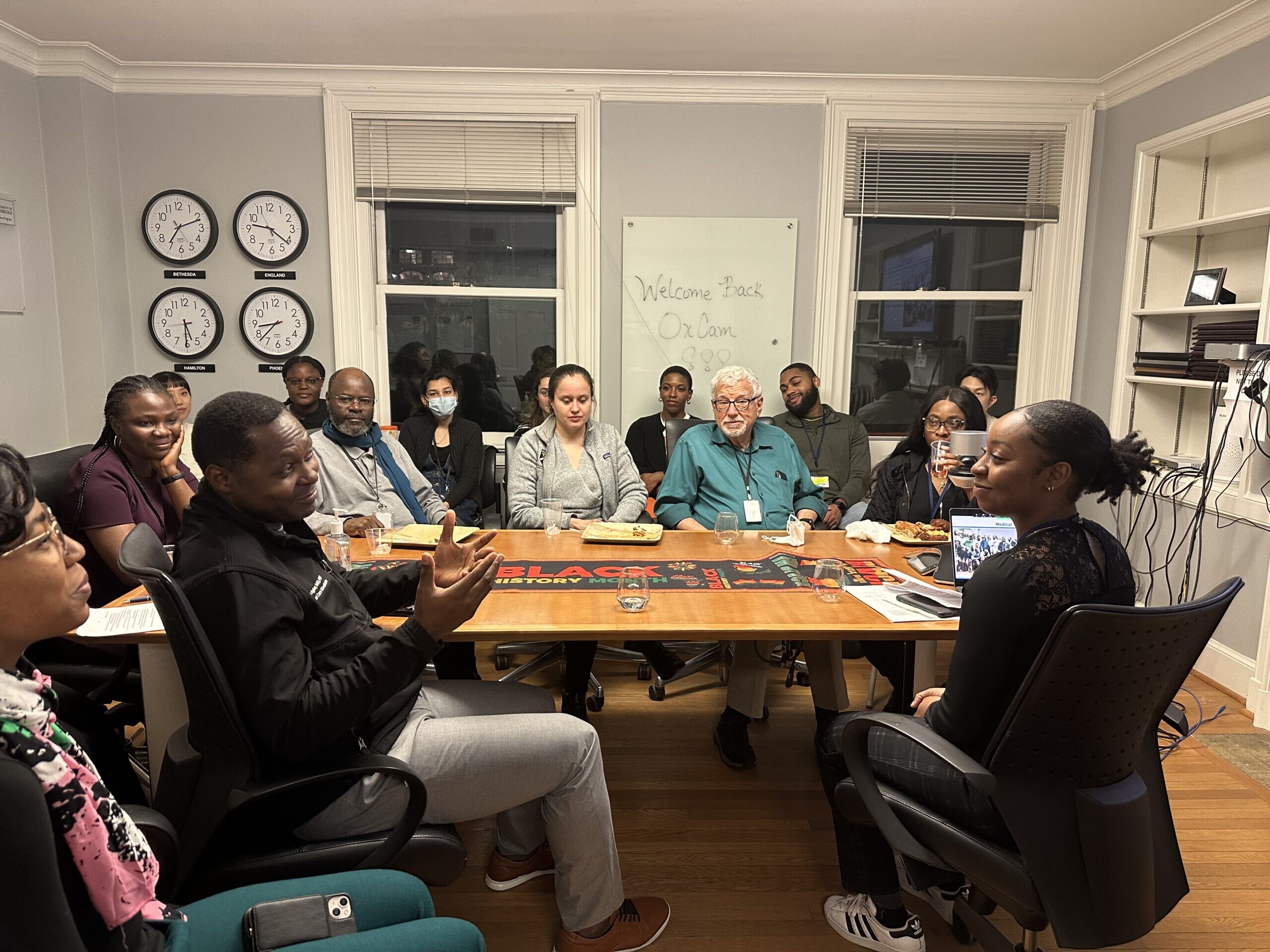Each February in the United States and each October in the United Kingdom, we celebrate Black History Month. This year’s theme in the United States was “Black Resistance” and in the United Kingdom “Time for Change: Action Not Words.” These campaigns acknowledge the past and the present in service to a brighter future. We are reminded that Black history comprises so much more than a past rooted in enslavement, segregation, and discrimination. The past is an immutable part of history that should be embraced, recognized, and commemorated for its role in shaping our nations.
Jasmine Mack, the Chair of the NIH-Oxford-Cambridge Scholars Student Programming Committee, and Theressa Ewa, the Vice Chair, aimed to organize events focused on Black scientists, physician-scientists, and biomedical trainees at the National Institutes of Health (NIH) and the University of Cambridge to honor Black History Month.
To recognize Black NIH leadership, they invited three eminent presenters to discuss their journeys, challenges, and tips for flourishing in environments that historically excluded minoritized scientists and physician-scientists. The purpose of this gathering was to foster community by providing opportunities to listen and reflect on shared experiences from our fellow Black scientists and physician-scientists in the NIH community. The invited speakers were as follows:
Dr. Sean Agbor-Enoh (NHLBI/NIH) is a Lasker Clinical Research Tenure Track Investigator, NIH Distinguished Fellow, and Laboratory Chief of the Laboratory of Applied Precision Omics at NHLBI. He is also an Associate Professor of Medicine at Johns Hopkins. Dr. Agbor-Enoh’s research focuses on the use of cell-free DNA and other genomic approaches in lung transplantation. He is the lead investigator of multiple studies, including Genomic Research Alliance for Transplantation (GRAfT), a consortium of NHLBI and thoracic transplant centers.
Dr. Sadhana Jackson (NINDS/NIH) is a board-certified pediatrician and pediatric hematologist/oncologist with clinical expertise and research efforts related to the blood-brain barrier and malignant glioma. Her clinical practice focuses on drug delivery of systemic agents for pediatric malignant brain tumor patients. As a tenure-track Investigator in NINDS and NCI, Dr. Jackson ties her clinical practice to her research efforts focused on understanding the heterogeneous permeability of the blood-brain barrier amongst malignant gliomas.
Dr. Sam Mbulaiteye (NCI-DCEG/NIH) is a senior investigator and an active member of the NIH and NCI community and has served on various search and technical committees. Dr. Mbulaiteye conducts research to understand the etiology of Burkitt lymphoma (BL), a cancer that occurs worldwide but has its highest incidence recorded in populations of sub-Saharan Africa. He is a member of the African Organization for Research and Training in Cancer (AORTIC), the Darwin College Society, the Cambridge Commonwealth Trust, and the World Federation of Scientists. He is currently a member of DCEG Genotyping Review Committee. He is also the Cambridge Dean for OxCam class of 2022!
“For this year’s Black History Month, it was important to me that we celebrated and recognized accomplished Black scientists and colleagues at the NIH. Jasmine and I wanted to create an atmosphere where attendees and speakers can have a moment to hear from one another, so we decided to have a dinner-styled seminar. For the scholars, who were NIH post-baccalaureate, pre-doctoral, and post-doctoral fellows, we cherished the opportunity to hear the experiences and wisdom of Drs. Agbor-Enoh, Jackson, and Mbulaiteye. As a first-year NIH OxCam Ph.D. student, I am excited to lead an event that will now become a tradition in the NIH OxCam community, ” noted Theressa.

The U.K. event was held in collaboration with the Cambridge University Afro-American Society (AFRAM) at Clare Hall, University of Cambridge. The keynote speaker was NIH Oxford-Cambridge Alumni and CEO and Co-founder of Start Codon, Dr. Jason Mellad.
Dr. Jason Mellad is a scientist entrepreneur who is passionate about translating innovative technologies into better patient outcomes. As CEO and co-founder of Start Codon, a Cambridge-based accelerator, he aims to identify and recruit the most disruptive healthcare start-ups worldwide, seed-fund them, and leverage the exceptional resources of the Cambridge Cluster to de-risk and drive their success.
“As the Student Programming Chair for NIH OxCam and the President of AFRAM, I wanted to organize a collaborative event that centered the stories of Black scholars in predominantly white institutions, which was the theme for both the NIH and Cambridge events. At Cambridge, in an intimate setting of 10 attendees, we engaged in a raw, honest discussion of experiences. Students and fellows who attended the event gained knowledge about the value of owning their power, being unapologetic and genuine, and not letting fear of failure hold them back. Future programming will likely feature other scholars and scientists who are open about overcoming personal obstacles and staying motivated in their various professions, which I hope will encourage aspiring scientists from minoritized groups,” remarked Jasmine.
The International Biomedical Research Alliance is proud to sponsor events aimed at creating a diverse, equitable, and inclusive community and training experience for Scholars in the NIH Oxford-Cambridge Scholars Program. Please reach out to our Director of Communication, Education, and Professional Development, Alexandra Ambrico, at aja@biomedalliance.org if you would like to be involved in hosting and/or supporting future events.

